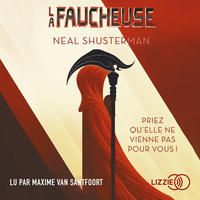You need to sign in or sign up before continuing.
Take a photo of a barcode or cover
emotional
mysterious
tense
medium-paced
Plot or Character Driven:
Character
Strong character development:
Yes
Loveable characters:
Yes
Diverse cast of characters:
Yes
Flaws of characters a main focus:
Yes
adventurous
dark
mysterious
tense
fast-paced
Plot or Character Driven:
Plot
I made it to the end without turning my nose up *that* many times, which is the highest praise a YA book is likely to elicit from me. It goes without saying that it has a ridiculous premise that's designed to give middle schoolers an excuse to read about over-the-top violence in a package that's not too scary or unfamiliar. Yet it does manage to broach some worthwhile philosophical questions, so I'm not inclined to hold that against it too much.
A couple of clumsy metaphors took me out of the story enough for me to make note of them:
--"True solace can be worth its weight in gold."
If you're going to use a cliché, at least make it make sense. I'm rather puzzled what the conversion rate might be from solace into ounces of gold.
--“Human beings are predatory by nature... That nature...can never be taken from us completely. Embrace it, Rowan. Suckle at its transformative breast."
To be fair, the character who says this is very pretentious and also very evil. But still, it reminded me that there was a Writer on Board.
I wasn't quite sure what to make of this book's treatment of religion. It posits that physical, temporal immortality for all renders religion obsolete in the eyes of humanity. This seems a spurious assumption: religion is at least as much about living with yourself now as living forever. Some religions don't promise anything after death. The book also establishes a very silly quasi-religion that feels like it would be more at home in a Douglas Adams novel. However, near the end of the book, it begins to hint at deeper religious themes: characters remark on the toll that continuing to live day after day indefinitely takes, and one character muses that it would be better to be eternal than immortal. If I ever get around to reading the sequels, it will be because I'm curious where this thread goes.
I was more impressed with the book's portrayal of a charismatic villain: a person who positions himself as a revolutionary mover and shaker who's really just dressing up the most base of sins in a new disguise. It reminded me of many of CS Lewis's villains, and perhaps even a bit of someone like Michel Foucault. It's a good way to introduce teenagers to a type of person we all have to keep on the lookout for, and I think it was written pretty convincingly.
A couple of clumsy metaphors took me out of the story enough for me to make note of them:
--"True solace can be worth its weight in gold."
If you're going to use a cliché, at least make it make sense. I'm rather puzzled what the conversion rate might be from solace into ounces of gold.
--“Human beings are predatory by nature... That nature...can never be taken from us completely. Embrace it, Rowan. Suckle at its transformative breast."
To be fair, the character who says this is very pretentious and also very evil. But still, it reminded me that there was a Writer on Board.
I wasn't quite sure what to make of this book's treatment of religion. It posits that physical, temporal immortality for all renders religion obsolete in the eyes of humanity. This seems a spurious assumption: religion is at least as much about living with yourself now as living forever. Some religions don't promise anything after death. The book also establishes a very silly quasi-religion that feels like it would be more at home in a Douglas Adams novel. However, near the end of the book, it begins to hint at deeper religious themes: characters remark on the toll that continuing to live day after day indefinitely takes, and one character muses that it would be better to be eternal than immortal. If I ever get around to reading the sequels, it will be because I'm curious where this thread goes.
I was more impressed with the book's portrayal of a charismatic villain: a person who positions himself as a revolutionary mover and shaker who's really just dressing up the most base of sins in a new disguise. It reminded me of many of CS Lewis's villains, and perhaps even a bit of someone like Michel Foucault. It's a good way to introduce teenagers to a type of person we all have to keep on the lookout for, and I think it was written pretty convincingly.
adventurous
dark
funny
hopeful
mysterious
reflective
tense
medium-paced
Plot or Character Driven:
A mix
Strong character development:
Yes
Loveable characters:
Yes
Diverse cast of characters:
Yes
Flaws of characters a main focus:
Yes
I love this book and the journal entries interspersed between chapters have even more weight to me now as a philosophy major than it did when I first read the book
adventurous
dark
mysterious
reflective
tense
medium-paced
Plot or Character Driven:
Plot
Strong character development:
Yes
Loveable characters:
No
Diverse cast of characters:
No
Flaws of characters a main focus:
Yes
4.5
Nmmn que bueeeeen libro, la trama, los personajes, todooo y qpd con los plot twist, amooo
Nmmn que bueeeeen libro, la trama, los personajes, todooo y qpd con los plot twist, amooo
I had such a good time with this. I can’t wait to carry on the series.
challenging
dark
mysterious
reflective
tense
fast-paced
Plot or Character Driven:
A mix
Strong character development:
Yes
Loveable characters:
Yes
Diverse cast of characters:
Yes
Flaws of characters a main focus:
Complicated





